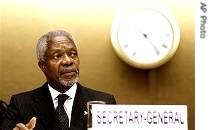2006年VOA标准英语-UN Leader Warns of Biological Weapons Threat(在线收听)
By Lisa Schlein
Geneva
20 November 2006
U.N. Secretary-General Kofi Annan is urging nations to do more to combat biological weapons, and to create global safeguards to keep them out of terrorist hands.
 Kofi Annan at a review conference on Biological Weapons Convention in Geneva |
||
"I encourage you to explore them, and not to return to the confrontational approaches of the past," said Kofi Annan. "Far more unites you than divides you. The horror of biological weapons is shared by all. As the convention states, their use would be 'repugnant to the conscience of mankind.'"
Annan said that, in the past five years, global circumstances have changed, and risks have grown. He said there is a strong focus on preventing terrorism today, as well as renewed concern about naturally occurring diseases, such as SARS or avian flu, being used as a terrorist weapon.
"These changes mean that we can no longer view the convention in isolation, as simply a treaty prohibiting states from obtaining biological weapons," he said. "But, we must also address terrorism and crime at the non-state and individual levels, with responses encompassing public health, disaster relief and efforts to ensure that the peaceful uses of biological science and technology can safely reach their potential."
The convention bans the development and stockpiling of germ-based weapons. But it has never had serious enforcement measures, because the threat of biological warfare was believed to be minimal when it was drafted during the height of the Cold War.
Efforts to strengthen the treaty gained momentum amid concerns that Iraq might use biological weapons during the Gulf War. Talks were suspended in 2001, when the the United States said a proposed enforcement regime could not be verified.
The head of the U.S. delegation, Assistant Secretary of State for International Security and Nonproliferation John Rood, said the measures the U.S. rejected five years ago would not have been effective in detecting biological weapons.
"We have not, in our analysis, seen a way to develop the sort of guaranteed verification measures you cited," said John Rood. "I think that is an area reasonable people can continue to study. But, at present, we do not see a regime that would be effective in that area."
Rood said the United States wants greater disease surveillance and better controls over material and technology, so they are not misused for bio-weapons. He said national enforcement of legislation is important, and there must be more oversight on research to prevent this work from being misused to make bio-weapons.